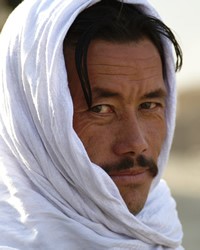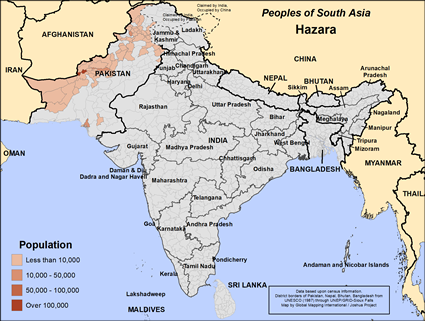Hazara unspecified in Pakistan

Photo Source:
Anonymous
|

Map Source:
People Group data: Omid. Map geography: UNESCO / GMI. Map Design: Joshua Project
|
| People Name: | Hazara unspecified |
| Country: | Pakistan |
| 10/40 Window: | Yes |
| Population: | 306,000 |
| World Population: | 4,775,700 |
| Primary Language: | Hazaragi |
| Primary Religion: | Islam |
| Christian Adherents: | 0.01 % |
| Evangelicals: | 0.01 % |
| Scripture: | New Testament |
| Ministry Resources: | Yes |
| Jesus Film: | Yes |
| Audio Recordings: | Yes |
| People Cluster: | Persian |
| Affinity Bloc: | Persian-Median |
| Progress Level: |
|
Introduction / History
The Hazara are probably of Mongol descent; descendants of soldiers left in Afghanistan by Genghis Khan in order to occupy the region. Their Mongol physical characteristics and their language have long distinguished them from the other ethnic groups of the area. Their language, called Hazaragi, is an Indo-Iranian tongue with many words borrowed from Mongol. Many Hazara also speak Dari Persian as a second language.
Their homeland, Afghanistan, has been shaken by rebellions and civil war. After an unsuccessful rebellion in the 1800s, some Hazara fled and settled in Pakistan. In recent years, they have been joined by other Hazara refugees fleeing the civil war in Afghanistan. The Hazara live primarily in central Afghanistan, but there are also significant communities living in Iran and Pakistan. The Hazara of Pakistan live mainly in and around the city of Quetta. Quetta is located in Pakistan's southwestern province of Baluchistan.
What Are Their Lives Like?
Traditionally, the Hazara were nomads raising sheep, goats, and horses. Now, some earn a living through mixed grain farming. The major crops are wheat and barley, and they also grow a variety of fruits. Many of the men work as cobblers, porters, water carriers or trash collectors. This willingness to perform menial tasks has had an adverse effect on them; it earned them a reputation as hardworking people, while also resulting in their being looked down upon and discriminated against.
Hazara men wear knee length, cotton shirts hanging over matching baggy trousers, embroidered skullcaps, and turbans. Women wear similar clothing, except that they use brightly colored shawls to cover their heads.
Hazara marriage ceremonies follow the traditional Shia Islamic pattern. Most marry within their own communities and nearly always within the Hazara ethnic group. They prefer marriages between first cousins, particularly from the father's side of the family. When a girl reaches about fifteen years of age, she is usually married to the man of her parents' choice.
Only boys have the opportunity for formal education, which usually lasts only one or two years. The teachings are centered on Islam, and memorization of poetry is a major part of their education. As a result, illiteracy is very high among the Hazara.
Despite their reputation as fierce, warlike people, the Hazara are widely renowned for their hospitality, warmth, and generosity. Also, Hazara women have a greater degree of social freedom than women in most other Muslim groups.
What Are Their Beliefs?
Unlike most Pakistanis who follow Sunni Islam, the Hazara follow the Shia sect of Islam. Although they shun the most stringent Muslim customs, the Hazara are devoted to their faith, praying five times per day while facing the holy city of Mecca and fasting during the month of Ramadan.
Religious authorities called Sayyids play an integral role in the Islamic beliefs of the Hazara. Sayyids have claimed descent from the founder of Islam, Mohammed. Although they were originally Arabs, the Sayyids of Pakistan have intermarried with the Hazara and have become much like them in physical appearance and culture. They use their sacred qualities to serve the religious needs of the common people. Hazaras believe the Sayyids' prayers and good favor bring blessing.
What Are Their Needs?
The Hazara are looked down upon and despised by other ethnic groups. Both in Afghanistan and Pakistan, the Hazaras are often physically attacked for their Shia faith. They are some of the poorest people of Pakistan and suffer an alarming array of health problems; eye diseases, leprosy, and tuberculosis are very common.
They also have great spiritual needs with few opportunities to encounter Jesus Christ who alone can provide them with answers.
Prayer Points
Pray for the Lord to protect these violated people.
Pray for the JESUS Film and other Christian materials to become readily available to the Hazaras in Pakistan and Afghanistan.
Pray for Hazara family heads to have a spiritual hunger that will lead them to the only Savior.
Pray for a Disciple Making Movement among the Hazara people in Pakistan and India.